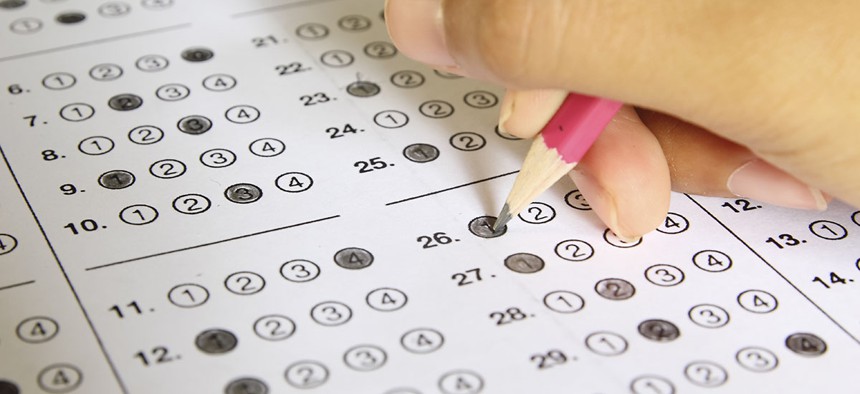Iraq Shut Down Its Internet to Prevent Sixth-Graders From Cheating

SOMKKU/Shutterstock.com
During exam seasons or political revolutions, government-ordered blackouts raise human-rights concerns.
The exam room is quiet, and you’re on a roll. You’re calculating percentages and ratios like a pro when suddenly—could it be? You forget the difference between a mean and a median. You slip your phone out of your pocket and stealthily open Google, but it won’t load. You glance at your neighbor and see the same look of panic on her face and a blank screen on her phone, too. Is Internet service down in the whole building?
If you’re one of the many thousands of sixth-graders taking a series of national exams in Iraq this month, it’s not just the building. The Internet is down in most of the country—and it’s because of the exams themselves.
The arms race between cheaters and test administrators is nothing new, and handheld devices that can connect to the Internet have tipped the scales in favor of test-takers looking for a little help.
But the Iraqi government has taken the sledgehammer approach to the problem: This is the second year in a row that it has ordered Iraqi telecom companies to shut down to the Internet in order to prevent cheating, according to human-rights groups. The research arm of Dyn, an Internet analytics company, logged a pattern of 3-hour long blackouts starting three days ago.
Last year’s shutdown during exam time drew rebukes from a group of digital-rights groups, who signed a letter pressing the Iraqi government to lift the block on connectivity.
“Now, unfortunately, it’s the same story all over again,” said Deji Olukotun, the senior global advocacy manager at Access Now, one of the groups that signed last year’s letter.
“Given the security situation in Iraq, it’s quite an extreme measure,” Olukotun said. “We see this as really disproportionate to what they’re trying to achieve.”
Wholesale Internet blackouts impinge on citizens’ free-speech rights by cutting off the country’s link to the external world, and can help governments escape scrutiny in cases of abuse. Blackouts can also delay and hinder emergency services, and have the potential to seriously harm a country’s economy, Olukotun said.
Globally, this is the 12th government-mandated Internet blackout that Access Now has recorded so far in 2016. But most of the time, blackouts or censorship are connected to political or military events.
Uganda blocked access to social-media apps in February during elections, for example. Before last year’s education-related shutdown, the only other time Iraq had blocked its Internet was in June 2014, when ISIS forces overran Mosul, a major city in the north of the country.
It’s less frequent that a government takes down the Internet to prevent cheating. Uzbekistan’s government shut down mobile internet during exams in 2014, and mobile data went down for the same reason just a few months ago in Gujarat, a state in the northwest of India.
Digital-rights groups are pressuring governments from all sides to stop Internet shutdowns. Peter Micek, global policy and legal counsel at Access Now, says groups are lobbying the United Nations Human Rights Council to pass a resolution condemning them.
At the same time, Access Now works with telecom companies in countries with shutdown-happy governments to improve reporting about outages and to organize pushback against blackout orders. (In one success story, telecom companies in the Central African Republic banded together in 2014 to resist requests for Internet and SMS bans.)
But it can be hard to organize telecom companies that are under immense pressures from authoritarian-leaning governments, and harder still to coordinate with on-the-ground activists and watchdogs when the Internet actually does go down.
Shutdowns aren’t always completely effective in keeping Internet users away from the services and information they’re looking for. Selective bans on social media, for example, can often be circumvented with VPNs or Tor. And even when the government asks telecom companies to shut down, officials may not be able to cut off an entire country’s connectivity.
Dyn’s graph of Internet traffic from Iraq shows that only two-thirds of networks appear to go down during the shutdown periods. That’s because service in Kurdistan—a portion of northern Iraq that has an independent regional government—doesn’t seem to be affected, says Doug Madory, Dyn’s director of Internet analysis.
Madory has studied shutdown patterns in the global Internet for years, and he saw a turning point in Egypt’s 2011 Internet blackouts. The Egyptian government ordered telecom companies to shut down access that January, just a few days after massive protests began unfolding in Cairo and around the country.
The blackout didn’t keep President Hosni Mubarak from being swept from power, but other countries in the region that came under pressure in subsequent Arab Spring movements picked up Egypt’s tactics: Syria, Libya, and Bahrain all used Internet blackouts to try and disrupt anti-government protests. Since then, Madory says, Internet shutdowns have become normalized.
Those blackouts were authoritarian governments’ frantic attempts to head off life-or-death crises. It’s hard to justify shutting off Internet access even in times of political turmoil—that’s when blackouts are most likely to be used to cover up human-rights abuses—but the reasoning behind Iraq’s rolling Internet blackouts is even less sound.
“Given all that is happening in Iraq (ISIS, massive corruption, impending summer heat, etc.), it is hard to believe cheating is worth disconnecting the country from the global Internet,” Madory wrote to me in an email. “It isn’t hyperbole to say that the government of Iraq faces multiple immediate existential threats—placement exams aren’t on that list, I would think.”
NEXT STORY: Smartphones Rule the Internet






